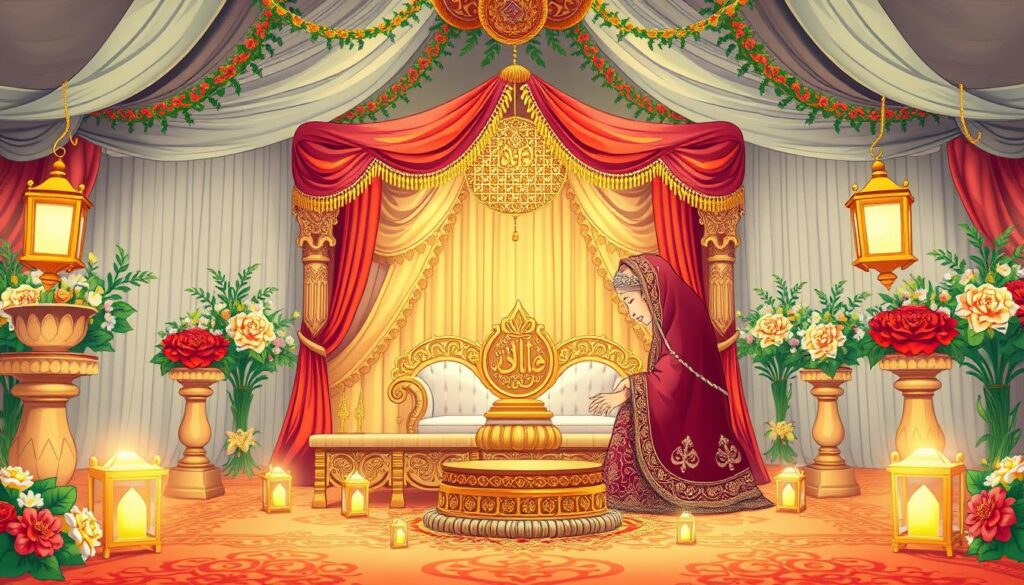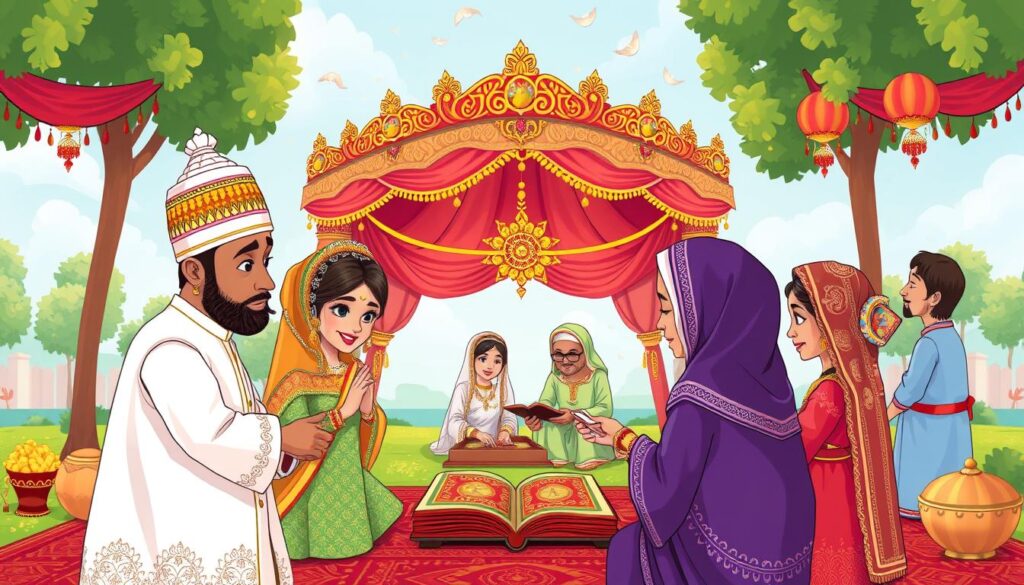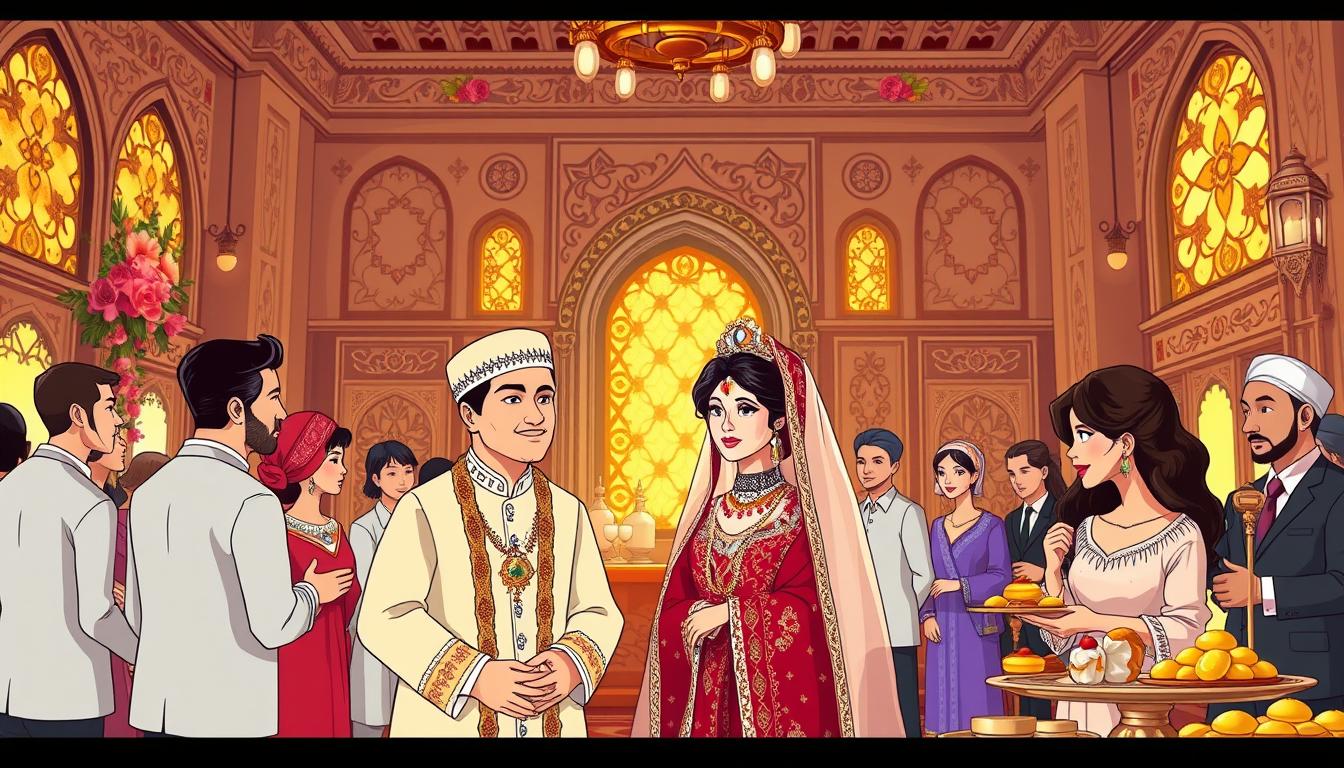Did you know that in Islam, a man can have up to four wives at once? Marriage is seen as a way to keep the faith strong, bring people together, and help everyone grow morally and spiritually. At Umar Khan Charity Organization, we value community and giving back. We want to share with you the beauty of Islamic marriage traditions.
We’ll explore the rituals and customs of Islamic weddings. We’ll see why they’re so important in the Muslim world. We’ll also talk about how giving back and being part of the community are key parts of Islamic marriage. Organizations like Umar Khan Charity Organization help spread these traditions.
Key Takeaways
- Islamic Marriage Traditions are highly valued in the Muslim community, promoting social harmony and moral growth.
- Muslim marriages involve a nikah ceremony, where the bride does not have to be physically present, and the Mahr is a mandatory gift given by the groom to the bride.
- Arranged marriages are common among Muslims, with parents frequently arranging marriages for their children, and mutual consent is critical in a Muslim marriage.
- Islamic wedding customs include the Mehndi ceremony, where henna designs are applied to the bride’s hands and feet, and the Walima, a feast hosted by the groom’s family.
- Muslim weddings showcase cultural diversity in attire, rituals, and celebrations, while maintaining core Islamic principles, and gift-giving is a common tradition at Muslim weddings.
- Islamic Marriage Traditions and Islamic wedding customs are evolving to include personalized elements, blending cultural and religious traditions with contemporary practices.
- Umar Khan Charity Organization plays a significant role in promoting Islamic Marriage Traditions and Islamic wedding customs, highlighting the importance of community involvement and charitable work.
Overview of Islamic Marriage Traditions
Understanding Islamic marriage traditions is key to building strong relationships. As we dive into Islamic marital ceremonies, we see marriage as a sacred bond in Islam. It’s vital for the Muslim community’s future. Muslim marriage rituals unite two people in love, respect, and support.
Importance of Marriage in Islam
Marriage is a cornerstone in Islam, boosting emotional, spiritual, and psychological health. Islam views marriage as a religious vow between the couple and Allah. The Prophet Muhammad said marriage is half of faith, showing its value in Islam.
Historical Context of Marriage Practices
The history of Islamic marriage is diverse, shaped by various cultures and traditions. Islamic marriage allows polygamy under certain rules but bans polyandry. It aims to foster love, happiness, and children in a stable home, protecting society from harm.
Key Components of Islamic Marriage
Understanding Islamic marriage is key for a happy union. Islamic wedding traditions and Muslim wedding practices highlight the importance of a marriage contract, known as Nikah. This contract outlines the rights and duties of both partners.
The Nikah is a formal agreement between the bride and groom, witnessed by two male witnesses. It’s a critical part of Islamic marriage ceremonies. It ensures both partners know their expectations and duties. Islamic marriage is a sacred bond that requires respect, trust, and commitment.
The Marriage Contract (Nikah)
The Nikah is essential in Islamic weddings. It makes sure both partners know their rights and duties. The contract includes the Mahr, a gift from the groom to the bride. Mahr can be cash, goods, or services like education.
Role of Witnesses in the Ceremony
Witnesses play a big role in the Nikah ceremony. They must be two male Muslims of good character. They confirm the marriage was done right according to Islamic rules. This makes the marriage valid and recognized by the Islamic community.
Understanding the Nikah and the role of witnesses shows the beauty of Islamic weddings. These traditions and practices aim to create a strong, lasting bond. They are based on respect, trust, and commitment.
| Component | Importance |
|---|---|
| Nikah | Outlines rights and responsibilities of both partners |
| Witnesses | Provide testimony that the marriage was conducted in accordance with Islamic principles |
Pre-Wedding Rituals
We think pre-wedding rituals are key in Islamic marriages. They bring the bride and groom’s families together. This unity is important for their future life together.
In Muslim weddings, there are four main pre-wedding rituals. The Mehandi ceremony is one of them. It involves applying henna to the bride’s hands and feet. This tradition is a sign of good luck and happiness for the couple.
Some important pre-wedding rituals include:
- Istikhara: a prayer to seek guidance and blessings from Allah
- Imam Zamin: the groom’s mother visits the bride’s house and ties a coin on her arm
- Manjha: the bride is applied with turmeric paste to brighten her skin
- Mehandi: henna is applied to the bride’s feet and hands
These rituals are a big part of Islamic marriage and Muslim traditions. They help the couple prepare for their new life. By understanding these rituals, we can see the beauty and importance of Islamic marriages.
The Nikah Ceremony
The Nikah ceremony is a key part of Islamic weddings. It marks the official union of the bride and groom with a contract signing. This ceremony is a formal agreement between the couple, outlining their rights and responsibilities towards each other. It is conducted in the presence of two male witnesses.
In Muslim wedding practices, the Nikah ceremony involves the couple signing a marriage contract. This contract includes the mahr, a gift given to the bride. The gift can be money, jewelry, or other items the bride prefers. The ceremony also includes the recitation of Quranic verses, highlighting the importance of mutual consent and respect in marriage.
Some key elements of the Nikah ceremony include:
- Mutual consent between the couple
- A legal guardian or representative (Wali)
- Two adult Muslim witnesses
- The mahr gift
- A written marriage contract signed by the couple and witnesses
By following these Islamic wedding customs and Muslim wedding practices, couples can ensure a strong and harmonious marriage. This is built on mutual respect and trust.
The Role of the Mahr in Islamic Marriage
Understanding the Mahr in Islamic marriages is key to seeing the beauty of Islamic marriage rituals. The Mahr is a payment from the groom to the bride. It’s a symbol of his commitment to her.
The Mahr is more than just money. It shows respect and appreciation for the bride. It can be money, goods, or even Quranic teachings. The groom and bride decide the Mahr amount, based on his wealth and her wishes.
Definition and Purpose of Mahr
The Mahr is a must in Islamic marriages. It ensures the bride’s financial security. It shows the groom’s responsibility and commitment.
Variations in Mahr Practices Across Cultures
Mahr practices differ in various cultures. In some, it’s paid all at once. In others, it’s spread out over time. The amount can range from a small gift to a large sum.
Some important Mahr facts include:
* It’s a must in Islamic marriages
* It symbolizes the groom’s commitment
* It can be money, goods, or Quranic teachings
* The amount depends on the groom’s wealth and the bride’s wish
* It’s a key part of the Islamic marriage contract

Learning about the Mahr helps us see the beauty of Muslim nuptial traditions. The Mahr is a unique and vital part of Islamic marriage. It promotes financial security and stability in marriage.
Post-Wedding Celebrations
We think post-wedding celebrations are key in Islamic marriages. They bring families together and strengthen unity. As we look into Islamic wedding traditions, the Walima feast stands out. It’s a big event, usually hosted by the groom’s family to celebrate the marriage.
In Islamic wedding traditions, the Walima feast is filled with congratulations, photos, and gifts. It’s a happy time that starts the newlyweds’ life together.
The Walima Feast
The Walima feast is a big celebration with friends and family. It’s a chance for the newlyweds to get blessings and wishes from their loved ones. In Muslim wedding practices, it’s a way for the groom’s family to welcome the bride into their circle.
Cultural Variations in Celebrations
Even though the Walima feast is a big deal in Islamic marriages, celebrations vary. In some places, it’s a big event, and in others, it’s smaller. But, the Walima feast is always important. It shows the joining of two families and the start of a new life.
The Role of Families in Islamic Marriage
Families are very important in Islamic marriages. They help make the marriage successful. In Islamic rituals, families are key because they strengthen the bond between the couple and their relatives.
Muslim traditions highlight the importance of family ties. They also show how parents help arrange marriages.
Some key aspects of family involvement in Islamic marriages include:
- Respect for elders, where experience and wisdom are revered with age
- Family celebrations and festivities, which bring together relatives and friends to rejoice in the union
- Traditional family structures, which are evolving to accommodate modern nuclear families
In Islamic marriage rituals, families do more than just arrange marriages. They also support and guide the couple after marriage. Understanding the role of families in Islamic marriages helps us see the value of Muslim traditions. These traditions help build strong, harmonious families.
Islamic Divorce Traditions
We know how vital Islamic divorce traditions are. They ensure a fair and just way to end a marriage. In these customs, divorce is called ‘Talaq’ and is both legal and religious.
Muslim wedding practices include different types of divorce. These are Talaq, Khula, and Mubarat, or mutual divorce.
Some key points about Islamic divorce traditions are:
- Talaq: started by the husband, with certain steps and rules.
- Khula: asked for by the wife, needing a court or authority’s approval.
- Mubarat: both partners agree to divorce, with advice and careful thought.
After a divorce, a Muslim woman has to wait a certain time, called ‘Iddah’. This time helps figure out if a child is the husband’s. It also gives a chance for the couple to get back together.
Islamic marriage contracts also include a financial promise for the wife, called ‘Mahr’. This helps her financially if the marriage ends or if her husband dies.
We stress the need to understand and respect Islamic divorce traditions. They are personal, emotional, and spiritual journeys for both partners. By doing this, we can build a more caring and supportive community for everyone.
Contemporary Trends in Islamic Marriages
We are seeing big changes in Islamic marriage rituals. Modern ways are changing Muslim nuptial traditions. We want to understand these new trends better.
Some key aspects of contemporary Islamic marriages include:
- Changes in traditional practices, such as the increased involvement of women in the marriage process
- The influence of modernization on marriage, including the use of technology to facilitate matchmaking and wedding planning
- The blending of Islamic marriage rituals with local customs and traditions
As we move through these changes, it’s key to remember Islamic marriage’s core values. These values are mutual respect, trust, and cooperation between spouses. By embracing these trends, we aim to build stronger, more fulfilling marriages.
Our ultimate goal is to deepen our understanding of Islamic marriage rituals and Muslim nuptial traditions. We also recognize the changing nature of contemporary Islamic marriages. We hope to inspire positive change and empowerment in our communities.
Marital Expectations and Responsibilities
In Islamic marriages, both partners have important roles to play. The husband is expected to take care of his wife’s financial and emotional needs. The wife, on the other hand, is expected to manage the home and care for their children.
The husband’s duties include giving a dowry to his wife and covering all costs during her pregnancy and childbirth. He must also provide her with her own place to live. The wife is expected to be obedient and handle household chores. But, she can say no to sex if the dowry isn’t paid, and she can help with household expenses if she wants.
Good communication is key in Islamic marriages. Couples should try to understand each other’s needs and work together. The Prophet (S) said, “A woman who dies while her husband is pleased with her will enter Paradise.” This shows how important it is to have a good relationship with your spouse.
- The husband must provide his wife with independent accommodation, including a private bedroom, kitchen, and bathroom.
- The husband must pay for all expenses during his wife’s pregnancy and childbirth.
- The wife has the right to refuse sexual intercourse if the dowry is not paid.
- Effective communication is essential in Islamic marriages.
By following these guidelines, couples can build a strong and loving relationship. This relationship is based on mutual respect, trust, and understanding of Islamic wedding traditions and Muslim wedding practices.
Cultural Variations in Islamic Marriage Practices
Islamic marriage rituals and Muslim nuptial traditions vary greatly across cultures and countries. We aim to understand the importance of these practices in different societies.
Differences Across Countries
There are about 1.6 billion Muslims worldwide, each with their own unique customs. Arab and South Asian weddings, for example, show strong Islamic influences. They feature grand entrances, known as zaffe, with music and dance.
Influence of Local Customs and Traditions
Local traditions greatly shape Islamic marriage practices. In some places, parents or guardians choose the partners. In others, matchmaking websites based on Islamic values are becoming popular. The Nikkah Ceremony is key, where both agree to marry and sign a nikkahnama.

Some unique customs include the Walima dinner, a must for the groom to announce the marriage. The Haq Mehr, a gift from the groom, is also a part of the Nikkah ceremony. These traditions enrich Islamic marriage practices and show the diversity of Muslim weddings.
- Arab weddings feature elaborate entries of the bride and groom, known as zaffe.
- South Asian weddings are known for high-budget and elaborate celebrations with multiple pre-wedding events.
- Matchmaking websites catering to Islamic principles have gained popularity in recent years.
By looking into these cultural differences, we can better appreciate the diversity and richness of Islamic marriage rituals and Muslim nuptial traditions.
Conclusion: The Future of Islamic Marriage Traditions
Exploring Islamic wedding customs and Muslim wedding practices shows us the importance of keeping their core values. It’s vital to adapt to today’s world while keeping the heart of Islamic marriages. These values include respect, compassion, and seeking spiritual growth.
Modern challenges like Western influences and changing social norms have affected Islamic marriages. Yet, by following the Quran and the Prophet Muhammad’s teachings, we can keep these unions sacred. We can do this through talking openly, engaging with our communities, and sticking to Islamic principles. This way, we can face today’s world while keeping our marriage traditions alive and meaningful.






